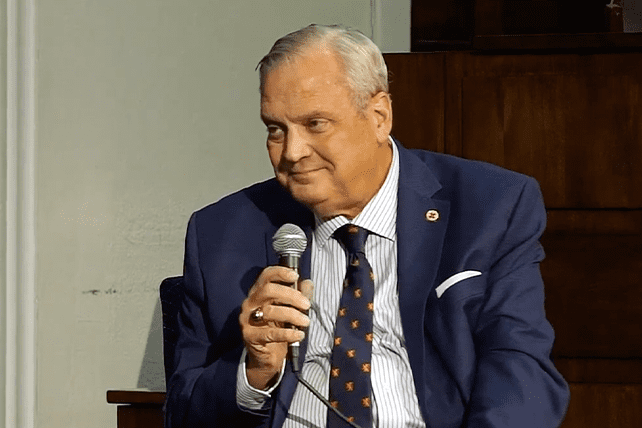Dr. Albert Mohler recently suggested that having women serve in pastoral leadership has never “made sense” to “the vast majority of Southern Baptists” and expressed his desire for the Southern Baptist Convention (SBC) to put the question to bed once and for all.
Mohler’s comments came in the context of a panel discussion hosted by the Kenwood Institute, which is a ministry of Kenwood Baptist Church in Louisville, Kentucky. The Institute exists to “strengthen Christ’s church, a pillar and buttress of the truth, by promoting and defending the whole counsel of God’s Word in the Reformed and Baptist traditions.”
The panel featured Mohler, who is the president of the Southern Baptist Theological Seminary (SBTS), Colin Smothers, who is director of the Kenwood Institute and executive director of the Council on Biblical Manhood and Womanhood (CBMW), and Denny Burk, who is a professor at SBTS, president of CBMW, and a board member of the Kenwood Institute.
A considerable portion of the discussion centered on the merits of the so-called Law Amendment, which was proposed by Virginia pastor Mike Law at the SBC’s annual meeting in 2023 and would update the denomination’s bylaws to allow a church to affiliate with the SBC only if it “affirms, appoints, or employs only men as any kind of pastor or elder as qualified by Scripture.”
Currently, churches must have a “faith and practice which closely identifies with the Convention’s adopted statement of faith” in order to affiliate with the SBC. And the denomination’s current statement of faith, called the Baptist Faith & Message 2000 (BFM2000), states, “While both men and women are gifted for service in the church, the office of pastor/elder/overseer is limited to men as qualified by Scripture.”
By this standard, the SBC has disfellowshipped several churches for ordaining women to the pastorate, most notably Saddleback Church.
Nevertheless, some questions remain about how closely a church must align with the BFM2000 with regard to women serving as pastors, particularly when women are not elders or lead pastors but serve as pastors over students and children or preach from the pulpit during Sunday services under the authority of an elder board.
Mohler and others who agree with him have argued that the Law Amendment will remove such ambiguity and bring a close to the conversation in the SBC. Furthermore, it will make it untenable for churches with a more moderate approach to women in pastoral leadership to continue associating with the SBC.
In order to be ensconced in the SBC constitution, the Law Amendment needs to be affirmed at two consecutive annual meetings. It was initially affirmed at the denomination’s 2023 meeting in New Orleans, and it will either be adopted or rejected in Indianapolis in June.
“If this amendment were to fail, I don’t think this issue would go away at all,” Mohler said. “It would continue, and then every single year, there will be some call to take action on this, to clarify this, and I don’t see that as healthy for the Convention.”

